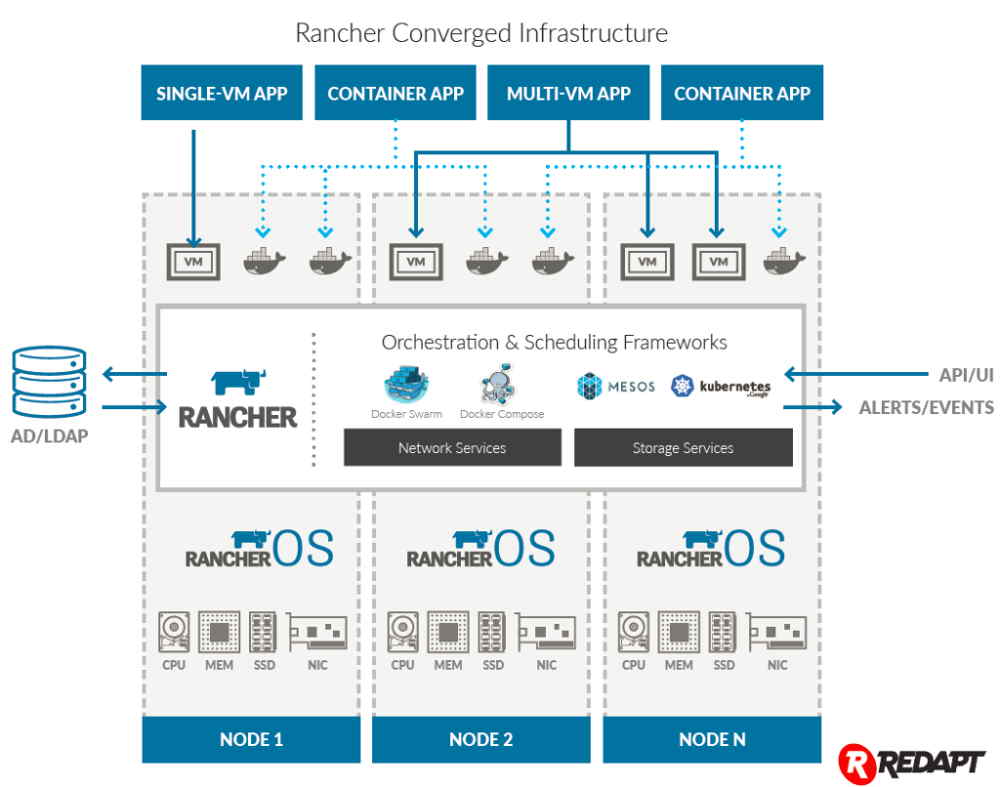Rancher Labs and Redapt Together With Hyper-Converged Infrastructure Platform for Containers
To build private container service from scratch
This is a Press Release edited by StorageNewsletter.com on November 20, 2015 at 2:51 pmRancher Labs and Redapt, Inc. announced an hyper-converged infrastructure platform for containers, simplifying and reducing the cost of building a private container service from scratch.
Click to enlarge
As the de-facto standard for cloud native workloads, Docker enables vendors like Rancher Labs and Redapt to create purpose-built infrastructure stacks for containerized workloads by defining an application packaging and runtime standard. The companies are working together to leverage containers, enabling the new hyper-converged infrastructure platform that is for simplifying operations, and reducing the cost of running container and cloud workloads.
“Rancher Labs’ hyper-converged infrastructure for containers is an innovative solution that effectively addresses today’s performance and complexity concerns,” said Stephen D. Hendrick, principal analyst, ESG. “Rancher Labs’ stack consists of the Rancher OS, Docker, KVM and persistent storage services with the Rancher container management platform deployed on top. This stack provides an efficient, lightweight and flexible container-based solution to today’s complex alternatives.“
Hyper-converged infrastructure solution for containers provides following benefits:
-
Built on the latest high-performance hardware: Utilizes Intel x86-based servers and SSD disks
-
Support for both VMs and containers: Runs VMs inside containers and at native speed, offering the same consistent management experience for both
-
Powerful resource scheduler: Improves density and utilization of computing resources
-
Continued use of familiar DevOps tools: Enables developers to utilize the same familiar native Docker CLI and API, and manage applications following their existing DevOps practices and tools such as Chef, Puppet, SaltStack and Ansible
-
Support for Docker orchestration frameworks: Includes support for Compose, Swarm and Kubernetes
-
Expanded capacity: Enables developers to expand capacity by registering instances in ublic clouds as computing resources
-
Overlay network mechanism: Provides network isolation and connectivity between containers and VMs running on different hosts
-
Support for Persistent Storage Services: Provides a rich set of storage features for stateful containers
“At Redapt, we’re focused on developing and delivering solutions that allow our clients to deploy and benefit from new, innovative technologies being brought to market,” said Jeff Dickey, chief innovation officer, Redapt. “Docker is a perfect example of this. Through this partnership with Rancher Labs, we’re enabling users to better leverage Docker containers, while also simplifying and reducing cost at the same time.“
Simplifying how organizations build private container services
Rancher and RancherOS are foundational technologies used to build hyper-converged infrastructure for containers. It is an open source software that makes it simple for organizations to deploy a private container service and deliver Docker orchestration to users. Users are then able to create resource pools from any host, and launch containers or application templates from Rancher’s UI or CLI. Users have complete control over how their applications are deployed, and Rancher provides all of the necessary infrastructure services such as networking, load balancing and storage to ensure the application runs seamlessly on any infrastructure. RancherOS is a small footprint Linux distribution built for running Docker containers. The solution runs all system services and user programs as Docker containers. At less than 30MB, it is the small and secure platform to run Docker in production.
“At Rancher Labs, we strive to build the best infrastructure platform for running containers in production,” said Sheng Liang, co-founder and CEO, Rancher Labs. “The hyper-converged infrastructure solution is a big step towards achieving that goal. We are excited to be working with Redapt to make private container services even more easy to deploy and efficient to operate in data centers.“















 Subscribe to our free daily newsletter
Subscribe to our free daily newsletter

